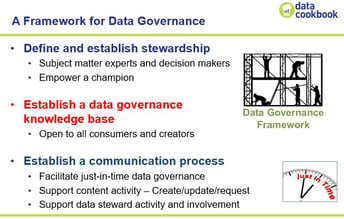 One of the three components of the data governance (data intelligence) framework is having a knowledge base, a central repository, that is open to all consumers and creators. This blog post is about who uses a data governance knowledge base (the place where all the data governance related content is stored), how people use a knowledge base, and the importance of content interdependencies. There is real value in trying to consolidate data governance related information together into a single centralized knowledge base to find both collisions and dependency between the information.
One of the three components of the data governance (data intelligence) framework is having a knowledge base, a central repository, that is open to all consumers and creators. This blog post is about who uses a data governance knowledge base (the place where all the data governance related content is stored), how people use a knowledge base, and the importance of content interdependencies. There is real value in trying to consolidate data governance related information together into a single centralized knowledge base to find both collisions and dependency between the information.
Think about who are the people going to interact with this knowledge base and interact with data governance in general. You have your consumers and requesters of data. And they are asking for reports or have questions about current reports. You also have your analysts and report creators. Then you have your data stewards (functional and technical) who are doing oversight and review over this content. There are others who are involved as well. All these people have a role to play in data governance and have interest in contributing or finding answers to information about your data. You want to make this knowledge base as open as possible to everyone that needs it.
How would these people be using that knowledge base? Here are some examples:
- Searching for information to see if there's a report available for them to access
- Asked to produce a report, but don’t understand how a field is calculated or where it lives in a system
- Need clarification on a column in a report or field on a dashboard
- Would like a new report and want to know how to request for it
- Have a quality issue and want to know what to do
Once content is created, it might involve a data steward to review and approve it. If it's something that needs to be built, like if it's a report that's been requested or a quality issue that needs to be fixed, you might have a task that needs to be created. Then that specific content gets delivered. Maybe it then needs to get tested. And finally, it gets documented which gets put in the knowledge base so that it can be accessed in the future. A knowledge base can be used as a building block for building something else.
Make the knowledge base easily accessible in how folks use the information such as:
- In your reporting tool, link to your data governance knowledge base or attaching the documentation to the report.
- In your ticketing system, connect to that data governance knowledge base if that's how people are initiating or concluding requests.
- Have other areas on your website (portal) where maybe people can search and access the information in data governance knowledge base without having to log into the separate knowledge base repository.
Versioning, approvals and comments are also important in a knowledge base. Information will change in the knowledge base so keeping track of version and change history is critical. Having an approval status is important so you know where items in the knowledge base stand (such as in progress). And having the ability to enter in comments on the knowledge base contents will make your life easier in the future.
Another point about aggregating information is not just that you're bringing in things from other silos (such as spreadsheets), but you are seeing the dependencies between different types of content. Some definitions refer to other definitions in your glossary. If you want to look at what an active employee is, you probably need to know what an employee is. If you're trying to manage this knowledge base in spreadsheets and word docs then it can be hard after a while to manage all these interdependencies. You should only have to change something in one place. If you change your definition of an employee, you shouldn't have to change the definition of active employee.
Having a data governance knowledge base is one of the key foundations of data governance. For more information on best practices for knowledge base, view our recorded webinar on the subject. See our other framework posts on data stewardship and communication process.
Hope this blog post was beneficial to you and your organization. IData has a solution, the Data Cookbook, that can aid the employees and the organization in its data governance, data stewardship and data quality initiatives. IData also has experts that can assist with data governance, reporting, integration and other technology services on an as needed basis. Feel free to contact us and let us know how we can assist.
Photo Credit DGFramework_Knowledgebase_BP #1067

